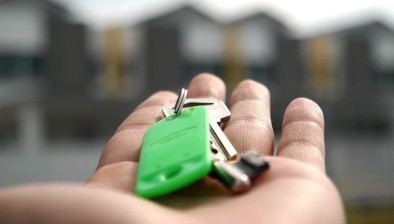ESPC: First-time buyers drive surge in Scottish property market
Scotland’s property sales volumes have gone up in the November 2023 – January 2024 period, according to the latest ESPC House Price Report.
The market remained steady during this traditionally quieter period for the market, with a small but positive rise of 2.8% in sales volumes. This hints at increasing numbers of buyers in the market in comparison to winter 2022/23.
Dunfermline continued to be hugely popular with buyers, as it secured the highest volumes of property sales, however levels were down 10.5% on November 2022 – January 2023. Leith was the second most-popular place to buy property, and sales volumes soared 17.8% year-on-year during this period. However, this rise is somewhat overshadowed by the rising popularity of family-friendly Corstorphine, where sales volumes rocketed 38.3% annually.
Two-bedroom flats in Leith were the biggest sellers, with sales volumes for this property type up 16.2% year-on-year. They were closely followed by one-bed flats in the same location; the sales volume of this property type increased by 33.3%, hinting at an influx of new buyers in the market looking to purchase for the first time.
Gorgie has long been touted as an up-and-coming neighbourhood, and the data from this three-month period shows it was increasingly popular with buyers: sales volumes of one-bedroom flats in Gorgie rose significantly, by 83.3% – unsurprising given this is the capital’s most affordable property type.
Outside of the capital, three-bedroom houses in Dunfermline were the biggest sellers, although figures were much steadier in comparison; sales volumes for this property type rose 8.3% annually.
Average selling prices declined as increasing competition affected buyer bids
In line with the trends we’ve seen in recent months, the average property selling price across Edinburgh, the Lothians, Fife, and the Borders declined 4.4% during November – January, taking the new average to £271,106. The increasing frequency of lower overbids beyond home report valuations could be partially the cause of this decline, however, there were also substantially more properties purchased in the lower LBTT bands, Bands 1 and 2, than the higher bands, meaning that overall, a larger volume of lower-priced properties were purchased during this period.
West Fife & Kinross and West Lothian both saw a boost in their region’s property prices; in West Fife & Kinross, the average property selling price was £210,454 (a rise of 3.5% annually), while in West Lothian, the average price rose significantly, up 28.6% year-on-year to £239,424.This is likely due to a sizeable increase in the volume of detached homes sold in the area, hinting at rising demand from family buyers for this region.
In Edinburgh, property prices declined 4.2%, taking the average to £289,363, however there has been a substantial boost to the volume of smaller, cheaper properties sold in the city, which could skew the overall figures. The popular South West of the city enjoyed the biggest increase in property prices throughout the capital, with property selling prices here rising 10.7% to £316,822. By contrast, the North West of Edinburgh saw the biggest decline, with average selling prices declining 19.8% to £247,164.
For buyers on a budget, one-bedroom flats in Dunfermline presented the most affordable opportunity, selling for £110,685 on average during this period. Edinburgh’s cheapest property type could be found in first-time buyer hotspot Gorgie, where one-bed flats cost on average £148,518.
Strong insertion levels boosted market competition
Sellers were very active in the market during November – January in comparison to the previous year; new property insertions increased by 13.6% during this time. A higher volume of sellers in the market means additional choice for buyers, and plenty of competition, giving the market a welcome boost after a long period of demand outstripping supply, especially for smaller, more affordable properties.

Unsurprisingly, Dunfermline, Leith and Corstorphine generated the highest levels of property listings. The volume of property insertions in Dunfermline rose by 19.3%, Leith was up 17%, and Corstorphine had 24.4% more properties on the market than the same time the previous year.
Two-bedroom flats in Leith were the most commonly listed, followed by three-bedroom houses in Dunfermline, in line with the sales volume figures. There was a notable increase in the volume of one-bedroom flats in Leith coming on to the market, with levels rising 60% year-on-year; perhaps a telling sign of landlords selling up, allowing more opportunity for first-time buyers.
It was good news for sellers when it came to marketing their properties too; 85.4% of homes were listed using the ‘offers over’ pricing structure, up from 76.5% the previous year.
Properties took longer to sell overall, but one Edinburgh hotspot moved at brisk pace
The median selling time for properties across Edinburgh, the Lothians, Fife, and the Borders decreased by five days year-on-year during November – January, to 24 days.
West Fife & Kinross boasted the fastest-selling properties, with homes going under offer in 19 days. This was also the only location that saw a quicker median selling time than the previous year, with homes selling one day faster overall.
By contrast, properties in West Lothian took the longest to sell, with a median time of 36 days.
In Edinburgh, properties in the trending East of the city were the quickest to sell, taking 19 days to go under offer. There was clear, significant demand for one-bedroom flats in this area in particular; one-bed flats in the Leith Walk area took 15 days to sell, which is seven days faster than the previous year. One-bedroom flats in the Easter Road area were incredibly sought-after too, going under offer in just nine days. This, once again, suggests a high volume of keen first-time buyers coming to the market, and acting quickly to secure a property in their key locations.
Buyers bid tactically to secure properties in a competitive market
Buyers took advantage of the high levels of competition in the market during November – January, as they made increasingly savvy bids to secure properties. Properties attained 101.5% of their home report valuations during this time, down 3.1 percentage points on the same time the previous year.
There were some bargains to be had too; 72.3% of homes sold for at least their home report valuation, compared to 84.5% the previous year.
In line with ESPC’s previous House Price Report, East Lothian properties experienced the largest decline in the amount of home report valuation paid by buyers, with a decline of 5.6 percentage points to 101.2%. This was closely followed by the Borders, where homes attained an average of 99.3%, down 5 percentage points on the same time last year.
19.5% of properties went to a closing date, down from 26.4%, in line with the increasing volume of properties on the market, increasing choice for buyers.

Paul Hilton
Paul Hilton, CEO of ESPC, commented: “November-January is typically a much quieter time for the property market, however, it’s clear to see that this wasn’t the case this time. The market appears fairly steady overall, and all the signs point to increasing numbers of first-time buyers coming into the market, which is very welcome news after a very difficult period financially for many in their position.
“There has been a significant increase in the available options for buyers, especially those looking for smaller flats in Edinburgh hotspots, perhaps due to rising numbers of landlords deciding to exit the rental market and offload their properties in response to ongoing legislation around rental rates, leading to an influx of first-time buyer-friendly homes coming on to the market.
“The average selling price has declined overall, but as with our previous report, if we look past the headline figures, we can clearly see reasons for this that should reassure homeowners that there hasn’t been a wide-ranging decline in property values.”
Mr Hilton continued: “Our latest report also indicates an increase in seller confidence in the market, which is again welcome news to help reinvigorate proceedings. There’s been a healthy increase in property listings, which is great news for buyers too.
“We can see the effects of rising numbers of properties coming on to the market – fewer closing dates and lower overbids are all examples of this – but it’s important to remember that this isn’t negative news for sellers, who can also reap the benefits in their onward property purchases.
“An increase in the volume of properties listed for offers over, rather than a fixed price, also demonstrates confidence and optimism in the market once again.”























